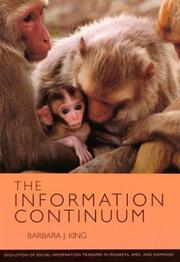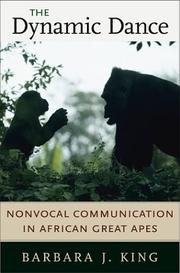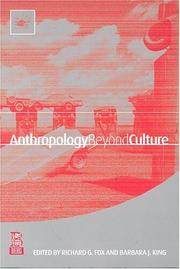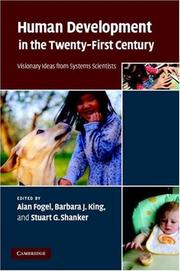| Listing 1 - 8 of 8 |
Sort by
|

ISBN: 0933452403 093345239X Year: 1994 Publisher: Santa Fe : School of American Research Press,
Abstract | Keywords | Export | Availability | Bookmark
 Loading...
Loading...Choose an application
- Reference Manager
- EndNote
- RefWorks (Direct export to RefWorks)
Animal communication --- Animal language --- Animaux [Communication chez les ] --- Communicatie --- Communicatie bij de dieren --- Communication --- Communication [Primitive ] --- Communication among animals --- Communication animale --- Communication humaine --- Dieren [Communicatie bij de ] --- Evolutie [Menselijke ] --- Evolution humaine --- Homme préhistorique --- Homme--Evolution --- Human evolution --- Language learning by animals --- Man [Prehistoric ] --- Mass communication --- Mens [Prehistorische ] --- Mens--Evolutie --- Menselijke evolutie --- Prehistoric man --- Prehistorische mens --- Prehistory --- Prehistoric peoples --- Primates --- Homme --- Behavior --- Evolution --- Moeurs et comportement --- Homme préhistorique

ISBN: 0674039610 9780674039612 9780674015159 0674015150 Year: 2022 Publisher: Cambridge, MA
Abstract | Keywords | Export | Availability | Bookmark
 Loading...
Loading...Choose an application
- Reference Manager
- EndNote
- RefWorks (Direct export to RefWorks)
Mother and infant negotiate over food; two high-status males jockey for power; female kin band together to get their way. It happens among humans and it happens among our closest living relatives in the animal kingdom, the great apes of Africa. In this eye-opening book, we see precisely how such events unfold in chimpanzees, bonobos, and gorillas: through a spontaneous, mutually choreographed dance of actions, gestures, and vocalizations in which social partners create meaning and come to understand each other. Using dynamic systems theory, an approach employed to study human communication, Barbara King is able to demonstrate the genuine complexity of apes' social communication, and the extent to which their interactions generate meaning. As King describes, apes create meaning primarily through their body movements--and go well beyond conveying messages about food, mating, or predators. Readers come to know the captive apes she has observed, and others across Africa as well, and to understand "the process of creating social meaning." This new perspective not only acquaints us with our closest living relatives, but informs us about a possible pathway for the evolution of language in our own species. King's theory challenges the popular idea that human language is instinctive, with rules and abilities hardwired into our brains. Rather, The Dynamic Dance suggests, language has its roots in the gestural "building up of meaning" that was present in the ancestor we shared with the great apes, and that we continue to practice to this day.
Apes --- Animal communication --- Animal biocommunication --- Animal language --- Biocommunication, Animal --- Language learning by animals --- Animal behavior --- Behavior
Book
ISBN: 9781565857339 Year: 2002 Publisher: Chantilly, Va The Teaching Company
Abstract | Keywords | Export | Availability | Bookmark
 Loading...
Loading...Choose an application
- Reference Manager
- EndNote
- RefWorks (Direct export to RefWorks)
Book
ISBN: 9780226360898 022636089X 9780226360928 Year: 2017 Publisher: Chicago The University of Chicago Press
Abstract | Keywords | Export | Availability | Bookmark
 Loading...
Loading...Choose an application
- Reference Manager
- EndNote
- RefWorks (Direct export to RefWorks)
Religion has been a central part of human experience since at least the dawn of recorded history. The gods change, as do the rituals, but the underlying desire remains--a desire to belong to something larger, greater, most lasting than our mortal, finite selves. But where did that desire come from? Can we explain its emergence through evolution? Yes, says biological anthropologist Barbara J. King--and doing so not only helps us to understand the religious imagination, but also reveals fascinating links to the lives and minds of our primate cousins. Evolving God draws on King's own fieldwork among primates in Africa and paleoanthropology of our extinct ancestors to offer a new way of thinking about the origins of religion, one that situates it in a deep need for emotional connection with others, a need we share with apes and monkeys. Though her thesis is provocative, and she's not above thoughtful speculation, King's argument is strongly rooted in close observation and analysis. She traces an evolutionary path that connects us to other primates, who, like us, display empathy, make meanings through interaction, create social rules, and display imagination--the basic building blocks of the religious imagination. With fresh insights, she responds to recent suggestions that chimpanzees are spiritual--or even religious--beings, and that our ancient humanlike cousins carefully disposed of their dead well before the time of Neandertals. King writes with a scientist's appreciation for evidence and argument, leavened with a deep empathy and admiration for the powerful desire to belong, a desire that not only brings us together with other humans, but with our closest animal relations as well.--
Book
Year: 2007 Publisher: Kapellen Pelckmans
Abstract | Keywords | Export | Availability | Bookmark
 Loading...
Loading...Choose an application
- Reference Manager
- EndNote
- RefWorks (Direct export to RefWorks)
Book
Year: 1994 Publisher: Oxford Pergamon Press
Abstract | Keywords | Export | Availability | Bookmark
 Loading...
Loading...Choose an application
- Reference Manager
- EndNote
- RefWorks (Direct export to RefWorks)

ISBN: 185973524X 1859735290 Year: 2002 Publisher: New York Berg
Abstract | Keywords | Export | Availability | Bookmark
 Loading...
Loading...Choose an application
- Reference Manager
- EndNote
- RefWorks (Direct export to RefWorks)
Anthropology --- Culture --- Anthropologie --- Congresses --- Congrès --- #SBIB:39A3 --- #SBIB:316.7C120 --- Antropologie: geschiedenis, theorie, wetenschap (incl. grondleggers van de antropologie als wetenschap) --- Cultuursociologie: algemene en theoretische werken --- Conferences - Meetings --- Congrès --- Congresses. --- Cultural sociology --- Sociology of culture --- Civilization --- Popular culture --- Social aspects

ISBN: 9780511489693 9780521881975 9781107403147 0511489692 9780511379185 0511379188 0511377436 9780511377433 0511374968 9780511374968 0521881978 1107185181 9781107185180 1281243736 9781281243737 9786611243739 6611243739 0511378319 9780511378317 0511376499 9780511376498 1107403146 Year: 2008 Publisher: Cambridge New York Cambridge University Press
Abstract | Keywords | Export | Availability | Bookmark
 Loading...
Loading...Choose an application
- Reference Manager
- EndNote
- RefWorks (Direct export to RefWorks)
How do human beings develop and function in relation to the human and natural world? The science of dynamic systems focuses on connections and relationships between people rather than on individual actions alone. This 2007 collection of engaging, non-technical essays, written by dynamic systems scientists in psychology, biology, anthropology, education, and sociology, challenges us to consider novel ways to enhance human development worldwide in the face of poverty, violence, neglect, disease and crises in our families. Focusing specifically on how to think about interventions and policies that will benefit human development from a systems perspective, this book brings research into the realm of application and policy. The authors use real-life examples to propose changes in clinical, educational and policy-making practices that will be of interest to professionals and practitioners alike.
Social ecology. --- Social psychology. --- Quality of life. --- Statics and dynamics (Social sciences) --- Social history --- Dynamics and statics (Social sciences) --- Equilibrium (Social sciences) --- Economics --- Social evolution --- Social sciences --- Sociology --- Life, Quality of --- Economic history --- Human ecology --- Life --- Basic needs --- Human comfort --- Social accounting --- Work-life balance --- Mass psychology --- Psychology, Social --- Psychology --- Social groups --- Ecology, Social --- Environment, Human --- Human ecology (Social sciences) --- Human environment --- Health Sciences --- Psychiatry & Psychology
| Listing 1 - 8 of 8 |
Sort by
|

 Search
Search Feedback
Feedback About UniCat
About UniCat  Help
Help News
News